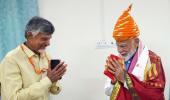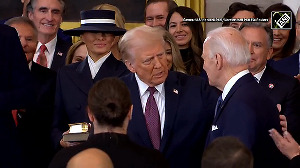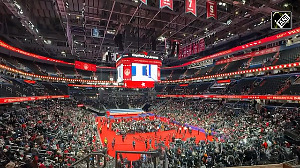For the first time in his political career, he failed to carry his party to even a working majority -- and again, for the first time in his career, he finds himself in a situation where he cannot rule by dictatorial fiat, points out Prem Panicker.

In elections, as in any other form of contest, a 'moral victory' is recorded in the fine print of history's footnotes while the narrative proper concerns itself with who won, and who lost.
In historical records that future generations will read, the outcome of the 2024 general election to form the 18th Lok Sabha will be recorded thus: The National Democratic Alliance, led by the Bharatiya Janata Party, won a historic mandate for a third consecutive term in office.
That is how it should be -- that is ineluctable fact, and facts admit of no buts and if-onlys.
So why is it that it is the losing Opposition alliance that seems buoyant and hopeful, and the winning NDA alliance and its multitude of megaphones that is reduced to defending its victory?
Banswara, in Rajasthan, provides part of the answer; Ayodhya, in the Lok Sabha constituency of Faizabad in Uttar Pradesh, provides another piece of the puzzle -- and the states of Uttar Pradesh and Maharashtra which send, in that order, the two largest contingents to the Lok Sabha, rounds out the picture.
On 21 April, after the first phase of polling, Narendra Modi addressed a rally (external link) in Banswara, in Rajasthan. On his web site (external link), the event is framed as a 'high-octane' speech.
Others, including global media houses such as the Washington Post, the New York Times, CNN, Al Jazeera, BBC, Time magazine and The Guardian, to name the more prominent outlets, condemned it as outright hate speech, while the Opposition in India called it out as violative of both the Model Code of Conduct governing elections, of the Representation of People's Act, and of the Hate Crimes and Hate Speech (Combat, Prevention and Punishment) Bill introduced by the Modi government in the Rajya Sabha in December 2022.
The contents of that speech -- where, infamously, Modi introduced the tropes of guspetiya, 'those who breed children', and mangalsutra into his campaign speeches -- are too well known to merit quotation here.
The relevant point is this: In Banswara, Raj Kumar Roat of the Bharatiya Adivasi Party defeated the BJP candidate by a margin of 247,054 votes in a state where, five years previously, the BJP had won 24 of the 25 seats on offer.
Surely the 820,821 people who voted for Roat and against the BJP couldn't all be Muslims, could they?

Up next, Ayodhya -- where on 22 January Modi, after a special 11-day fast, donned the mantle of mukya yajaman and performed the pran prathishta of the Ram idol in the partially-constructed temple in Ayodhya, and jump-started the party's election campaign.
The party and its mouthpieces have vociferously claimed that the ceremony was not scheduled with an eye to the upcoming elections -- a claim belied by Modi himself, who with impunity repeatedly violated the Model Code of Conduct by claiming, in his election speeches, that if the Opposition came to power it would bulldoze the temple, that it would put a 'Babri lock on the Ram temple', that it would reduce Ram to living in a tent again.
In Faizabad, the constituency in which Ayodhya falls, Dalit candidate Awadesh Prasad of the Samajwadi Party defeated two-time MP Lallu Singh of the BJP by a margin of 54,567 votes.
This is not to say that Faizabad voted against the Ram temple; rather, they voted against exploitation in the name of religion.
In the run-up to the inauguration, landholders in areas outside of the temple complex were coerced, by local BJP and BJP-adjacent leaders, into selling their land at a pittance; this land was then resold to big name real-estate developers at massive mark-ups.
Bulldozers were deployed to demolish houses and shops -- community-agnostic -- not just in Ayodhya but also in Faizabad to widen roads leading to the temple.
Local-owned shops in and around Ayodhya were taken over, often through coercion, by outsiders with political muscle.
This is what the 554,289 voters -- again, largely Hindu -- who opted to go against the BJP were voting against: The cynical exploitation of a revered deity for political and personal gain.
And for good measure Saket Mishra, son of Nripendra Mishra, Modi's former advisor turned chairman of the Ram Mandir Construction Committee, lost the Shravasti seat in UP by a margin of 76,673 votes.
Before zooming out to take in the larger UP-level view, shift your focus to Maharashtra for a moment.
If any state embodied the BJP's -- Modi's -- naked hunger for power at all costs, it was this western state.
The BJP engineered a split in the Shiv Sena even at the cost of demoting its own regional level leader, Devendra Fadnavis.
It engineered a split in the NCP, even at the cost of losing its anti-corruption sheen and inducting a leader Modi himself had repeatedly accused of a Rs 70,000 crore scam.
It engineered a situation where the original Sena and NCP were deprived of brand recognition in the form of their election symbols.
It tore apart families, it used its investigative agencies to the fullest, it pumped unimaginable sums into a contest it badly needed to win, both for numbers and for validation of its practices.
It lost. A comparison with 2019 is not apples to apples because of the forcibly altered political landscape, but when the dust settled, the Congress had won 13 seats (gaining 12), the Shiv Sena (UBT) had won 9, the Sharad Pawar-led faction of the NCP won 8.
The BJP on the other hand lost 14 seats and was reduced to 9 seats from its 2019 tally of 23; the Shinde Sena won just seven of the 15 seats it had contested, and Ajit Pawar's breakaway faction of the NCP was reduced to a solitary seat.
The only way you can frame the result is as an unequivocal repudiation of naked ambition, of power at all costs. (A more nuanced analysis will need to wait till the ECI publishes granular constituency-wise details).

That brings back me to Uttar Pradesh -- a state the BJP could not possibly lose, not with Modi and Adityanath, the two most popular leaders of the party of Hindutva, fronting the campaign.
In 2019, the BJP contested 78 of the 80 seats on offer and its ally Apna Dal (Soneylal) contested the other two.
The BJP won 62 seats with 49.56% of the votes (its ally won one); the next highest was the Bahujan Samaj Party with a vote share of just 19.26%.
It was arithmetically impossible, political analysts agreed, that the Samajwadi Party (17.96% vote share in 2019) and the Congress (a pathetic 6.31%), could, even in alliance, make a dent in the state.
Proofs were offered in support of that hypothesis -- as for instance that a 'scared' Rahul Gandhi had ducked a clash with Smriti Irani in Amethi.
Modi agreed with the analysts. He contemptuously dismissed the SP/Congress alliance as one run by 'do ladke' of no account.
The result? The BJP won 33 seats, a loss of 29 seats. The Samajwadi Party won 37 seats and the Congress won six.
Read that again: The SP won more seats in UP than the ruling BJP did.
When constituency-wise numbers and demographic breakups are declared, a clearer picture will emerge of the faultlines that triggered the BJP implosion -- but one fact is clear: Hindus in sufficient numbers did not think that letting the Bulldozer Baba's weapon of mass destruction loose on Muslims and other minorities or bumping off people in the name of being tough on crime, was sufficient palliative for acute economic distress and unemployment.

No one saw this coming, analysts said on TV as the results poured in and it became apparent that the debacle of UP would be the single biggest hurdle in the way of the BJP crossing the halfway mark.
Really? People did. The former psephologist Yogendra Yadav, for instance, repeatedly told anyone who would listen that there was a groundswell in UP against the BJP, and he said this on the basis of persistent, comprehensive, ground reporting.
I had pointed out that there is a rogue wave rising in UP and across the north (and no, I am not puffing myself off -- my limited point is that if you were willing to ignore the hype generated by the BJP's propaganda machine and listen to the people on the ground, you could see this coming.) But never mind Yadav, or me for that matter: As early as a year ago, in May 2023, RSS chief Mohan Bhagwat ventriloquised a warning, based on an extensive survey carried out by RSS shakas, through the Sangh's weekly Organiser.
'Without strong leadership and effective delivery at the regional level, Prime Minister Modi's charisma and Hindutva as an ideological glue would not be sufficient,' the magazine said in a signed editorial. (external link) (Viewed in the rear-view mirror, the points made in that editorial, written after an internal survey in the wake of the BJP's crushing defeat in the Karnataka assembly elections of 2023, are remarkably prescient).

Which brings us full circle to the first draft of history, which reads: Modi lost while winning. Because no matter how it is spun, the fact is that this election was about - only about -- Modi.
Modi was omnipresent, through his rallies, his roadshows, the scripted interviews at the rate of one a day, and the wall-to-wall coverage tame media, acting as a force multiplier, voluntarily accorded him.
He was the candidate in every constituency -- the party said so; he even said so himself.
Modi was omnipotent -- no law applied to him; the Model Code of Conduct was ignored with impunity; the dozens of complaints filed against his hate-filled rhetoric 'disposed of' by the institution that was sworn to uphold free and fair elections.
Modi was omniscient -- the non-biological leader teleported from the heavens who could see, and therefore shape, not only the India of 2047 but even peer into the mists of time and produce a 1,000-year vision, albeit sans operational detail.
As election campaigns go, this one was as reductive as it gets. Modi said, in paraphrase: 'I am the savior and the Lord'. And the electorate replied, 'No you are not', and gave him an unmissable reminder of his fallibility, his mortality.
Modi won a Pyrrhic victory. For the first time in his political career, he failed to carry his party to even a working majority -- and again, for the first time in his career, he finds himself in a situation where he cannot rule by dictatorial fiat.
He needs the support of two major allies, neither known for constancy -- and when it comes to government formation, he faces the difficult task of satisfying their ambitions while holding on to key portfolios such as Finance, Defense, and Home.
That is half the battle. He then has to contend with a stressed economy (the electorate has clearly signaled that it is not buying the Modi version of India Shining), an empowered Opposition, and a fractious populace, and to confront the fact that he cannot, as he has in his first two terms, rule by imperial fiat; he can no longer push his wills and his whims through Parliament by the brute force of a majority.
While this does not purport to be a comprehensive analysis of the election results, a broad throughline for the narrative lies in words a close friend relayed to me, from an influential food entrepreneur in Uttar Pradesh:
'Democracy ki baat karein toh banda zinda hai'.
Feature Presentation: Aslam Hunani/Rediff.com











 © 2025
© 2025